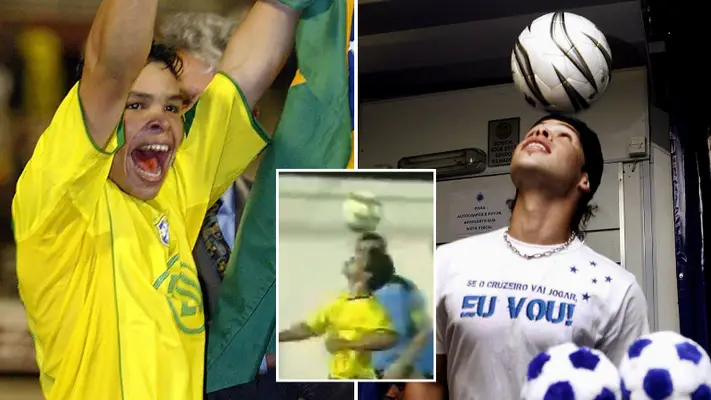
Brazilian footballer Kerlon has opened up about his infamous 'seal' dribble that caused football laws to be changed.
The attacking midfielder, who is now 36, regularly utilised the dribble technique throughout his time as a young player at Cruzeiro.
Rather than use his feet to run with the ball, Kerlon would carry the ball using his head to continuously bounce it in the air.
As you can imagine, the display didn't impress opposing players.
Advert
In 2007, Atletico Mineiro defender Dyego Coelho elbowed the young midfielder - earning a four-month ban for his troubles.
The incident caused the sport's lawmakers to investigate, and they decided to allow referees to punish players for unsporting behaviour if they used the 'seal dribble' again, citing a lack of respect.
In a time in which Ronaldinho was rising to prominence as the most exciting footballer in Europe, there was plenty of hype surrounding Kerlon in the early 2000s.
After scoring eight goals in seven games for Brazil U17s, he quickly became a focus for many of Europe's top scouts, and he signed for Inter Milan in 2008.
However, Kerlon never played for them due to knee injuries, which ultimately prevented him from becoming a world star.
He ended his career as a football journeyman, playing in Japan, the United States, Malta, Brazil and Slovakia, where he retired at the age of 29 in 2017 after a staggering six anterior cruciate ligament (ACL) injuries.
Now, in an interview with The Athletic, Kerlon has answered the one question fans have about the 'seal dribble' - was it completely legal?
He explains: "When I was a very young kid, I would train a lot with my dad. Just us two.
"One day, he kicked the ball up high for me. It bounced on the floor and came up to my head. I did about four or five little headers in a row, keeping the ball up.
"My dad stopped. He asked, 'If you ran with the ball on your head like that, would it be a free kick?'
"I said that I didn't know, but that we should find out.
"My dad looked up the rules and saw that it was legal. There was no issue with it."